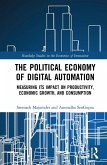Europe and Developing Countries in the Globalized Information Economy (eBook, PDF)
Employment and Distance Education
Redaktion: Bastos, Maria Ines; Mitter, Swasti
42,95 €
42,95 €
inkl. MwSt.
Sofort per Download lieferbar

21 °P sammeln
42,95 €
Als Download kaufen

42,95 €
inkl. MwSt.
Sofort per Download lieferbar

21 °P sammeln
Jetzt verschenken
Alle Infos zum eBook verschenken
42,95 €
inkl. MwSt.
Sofort per Download lieferbar
Alle Infos zum eBook verschenken

21 °P sammeln
Europe and Developing Countries in the Globalized Information Economy (eBook, PDF)
Employment and Distance Education
Redaktion: Bastos, Maria Ines; Mitter, Swasti
- Format: PDF
- Merkliste
- Auf die Merkliste
- Bewerten Bewerten
- Teilen
- Produkt teilen
- Produkterinnerung
- Produkterinnerung

Bitte loggen Sie sich zunächst in Ihr Kundenkonto ein oder registrieren Sie sich bei
bücher.de, um das eBook-Abo tolino select nutzen zu können.
Hier können Sie sich einloggen
Hier können Sie sich einloggen
Sie sind bereits eingeloggt. Klicken Sie auf 2. tolino select Abo, um fortzufahren.

Bitte loggen Sie sich zunächst in Ihr Kundenkonto ein oder registrieren Sie sich bei bücher.de, um das eBook-Abo tolino select nutzen zu können.
This volume explores the challenges and the opportunities created by the rapid growth of 'telematics'. The authors explore the differing responses of Europe and of the developing world.
- Geräte: PC
- mit Kopierschutz
- eBook Hilfe
- Größe: 1.97MB
Andere Kunden interessierten sich auch für
![Europe and Developing Countries in the Globalized Information Economy (eBook, ePUB) Europe and Developing Countries in the Globalized Information Economy (eBook, ePUB)]() Europe and Developing Countries in the Globalized Information Economy (eBook, ePUB)42,95 €
Europe and Developing Countries in the Globalized Information Economy (eBook, ePUB)42,95 €![The Political Economy of Digital Automation (eBook, PDF) The Political Economy of Digital Automation (eBook, PDF)]() Sreenath MajumderThe Political Economy of Digital Automation (eBook, PDF)42,95 €
Sreenath MajumderThe Political Economy of Digital Automation (eBook, PDF)42,95 €![Information and Communication Technologies for Development Evaluation (eBook, PDF) Information and Communication Technologies for Development Evaluation (eBook, PDF)]() Information and Communication Technologies for Development Evaluation (eBook, PDF)42,95 €
Information and Communication Technologies for Development Evaluation (eBook, PDF)42,95 €![5G, Cybersecurity and Privacy in Developing Countries (eBook, PDF) 5G, Cybersecurity and Privacy in Developing Countries (eBook, PDF)]() 5G, Cybersecurity and Privacy in Developing Countries (eBook, PDF)110,95 €
5G, Cybersecurity and Privacy in Developing Countries (eBook, PDF)110,95 €![Digital Economy for Customer Benefit and Business Fairness (eBook, PDF) Digital Economy for Customer Benefit and Business Fairness (eBook, PDF)]() Digital Economy for Customer Benefit and Business Fairness (eBook, PDF)97,95 €
Digital Economy for Customer Benefit and Business Fairness (eBook, PDF)97,95 €![Sustainable Digital Technologies (eBook, PDF) Sustainable Digital Technologies (eBook, PDF)]() Sustainable Digital Technologies (eBook, PDF)52,95 €
Sustainable Digital Technologies (eBook, PDF)52,95 €![Internet of Things and Big Data Analytics for a Green Environment (eBook, PDF) Internet of Things and Big Data Analytics for a Green Environment (eBook, PDF)]() Internet of Things and Big Data Analytics for a Green Environment (eBook, PDF)52,95 €
Internet of Things and Big Data Analytics for a Green Environment (eBook, PDF)52,95 €-
-
-
This volume explores the challenges and the opportunities created by the rapid growth of 'telematics'. The authors explore the differing responses of Europe and of the developing world.
Dieser Download kann aus rechtlichen Gründen nur mit Rechnungsadresse in A, B, BG, CY, CZ, D, DK, EW, E, FIN, F, GR, HR, H, IRL, I, LT, L, LR, M, NL, PL, P, R, S, SLO, SK ausgeliefert werden.
Produktdetails
- Produktdetails
- Verlag: Taylor & Francis
- Seitenzahl: 272
- Erscheinungstermin: 10. Juni 1999
- Englisch
- ISBN-13: 9781134642571
- Artikelnr.: 42653745
- Verlag: Taylor & Francis
- Seitenzahl: 272
- Erscheinungstermin: 10. Juni 1999
- Englisch
- ISBN-13: 9781134642571
- Artikelnr.: 42653745
- Herstellerkennzeichnung Die Herstellerinformationen sind derzeit nicht verfügbar.
Bastos, Maria Ines ; Mitter, Swasti
Introduction Part I: Information Revolution and New Modes of Employment and Work Organisation Chapter 1. Relocation of information processing work: Implications for trade between Asia and the European Union Swasti Mitter and Umit Efendioglu
UNU/INTECH
The Netherlands Chapter 2. Beyond anecdotes: On qualifying the globalisation of information processing work Ursula Huws
Analytica
London
UK A non-European counterpoint Trade in Software services: From international trade to teletrade. The case study of Tata Consultancy services in India. N.P. Basrur
Tata Consultancy Services
Bombay
India and Seema Chawla
UNU/INTECH
The Netherlands Chapter 3. Externalising information processing work: Breaking the logic of spatial and work organisation Geraldine Reardon
Trade Union Researcher
London
UK Chapter 4. Call centres and the prospects for export-oriented work in the developing world: Evidence from western Europe Ranald Richardson
University of Newcastle
UK A non-European counterpoint The globalised information society and its impact on Europe-Maghreb relations Abdelkader Djeflat
Universite des Sciences et Technologies de Lille
France Chapter 5. Innovation and competitiveness in complex product systems: The case of mobile phone systems Andrew Davies
University of Sussex
UK A non-European counterpoint The South Africa mobile phone system Dave Kaplan
University of Cape Town
South Africa Part II: Learning with telematics in the globalised information society Chapter 6. Europe and developing countries in the emerging on-line education market Maria Ines Bastos Chapter 7. Lifelong learning policies in a new technological era Albert Tuijnman
Institute of International Education
Stockholm
Sweden A non-European counterpoint Productive two-way collaboration between technologically developed and developing countries in new technologies for education Peter E. Kinyanjui
The Commonwelath of Learning
Canada Chapter 8. Testing tecnology for tele-education: Pilot projects at KPN in the Netherlands Eline de Kleine
KPN Research
The Netherlands A non-European counterpoint The Brazilian 'TELECURSO 2000'. An experience with applications of communications technologies to vocational and continuous education Arlette A. Paula Guibert
National Service of Industrial Apprenticeship
Regional Department of Sao Paolo
Brazil Chapter 9. Technologies for distance education in developing countries Wolfram Laaser
Fern Universitaet Hagen
Germany Chapter 10. KIDLINK - Global network for youth Claus Berg
Ministry of Education
Denmark A non-European counterpoint Distance education in Latin America at the technology cross- roads Fabio Jose Chacon Duque
Open National University
Venezuela Conclusions
UNU/INTECH
The Netherlands Chapter 2. Beyond anecdotes: On qualifying the globalisation of information processing work Ursula Huws
Analytica
London
UK A non-European counterpoint Trade in Software services: From international trade to teletrade. The case study of Tata Consultancy services in India. N.P. Basrur
Tata Consultancy Services
Bombay
India and Seema Chawla
UNU/INTECH
The Netherlands Chapter 3. Externalising information processing work: Breaking the logic of spatial and work organisation Geraldine Reardon
Trade Union Researcher
London
UK Chapter 4. Call centres and the prospects for export-oriented work in the developing world: Evidence from western Europe Ranald Richardson
University of Newcastle
UK A non-European counterpoint The globalised information society and its impact on Europe-Maghreb relations Abdelkader Djeflat
Universite des Sciences et Technologies de Lille
France Chapter 5. Innovation and competitiveness in complex product systems: The case of mobile phone systems Andrew Davies
University of Sussex
UK A non-European counterpoint The South Africa mobile phone system Dave Kaplan
University of Cape Town
South Africa Part II: Learning with telematics in the globalised information society Chapter 6. Europe and developing countries in the emerging on-line education market Maria Ines Bastos Chapter 7. Lifelong learning policies in a new technological era Albert Tuijnman
Institute of International Education
Stockholm
Sweden A non-European counterpoint Productive two-way collaboration between technologically developed and developing countries in new technologies for education Peter E. Kinyanjui
The Commonwelath of Learning
Canada Chapter 8. Testing tecnology for tele-education: Pilot projects at KPN in the Netherlands Eline de Kleine
KPN Research
The Netherlands A non-European counterpoint The Brazilian 'TELECURSO 2000'. An experience with applications of communications technologies to vocational and continuous education Arlette A. Paula Guibert
National Service of Industrial Apprenticeship
Regional Department of Sao Paolo
Brazil Chapter 9. Technologies for distance education in developing countries Wolfram Laaser
Fern Universitaet Hagen
Germany Chapter 10. KIDLINK - Global network for youth Claus Berg
Ministry of Education
Denmark A non-European counterpoint Distance education in Latin America at the technology cross- roads Fabio Jose Chacon Duque
Open National University
Venezuela Conclusions
Introduction Part I: Information Revolution and New Modes of Employment and Work Organisation Chapter 1. Relocation of information processing work: Implications for trade between Asia and the European Union Swasti Mitter and Umit Efendioglu
UNU/INTECH
The Netherlands Chapter 2. Beyond anecdotes: On qualifying the globalisation of information processing work Ursula Huws
Analytica
London
UK A non-European counterpoint Trade in Software services: From international trade to teletrade. The case study of Tata Consultancy services in India. N.P. Basrur
Tata Consultancy Services
Bombay
India and Seema Chawla
UNU/INTECH
The Netherlands Chapter 3. Externalising information processing work: Breaking the logic of spatial and work organisation Geraldine Reardon
Trade Union Researcher
London
UK Chapter 4. Call centres and the prospects for export-oriented work in the developing world: Evidence from western Europe Ranald Richardson
University of Newcastle
UK A non-European counterpoint The globalised information society and its impact on Europe-Maghreb relations Abdelkader Djeflat
Universite des Sciences et Technologies de Lille
France Chapter 5. Innovation and competitiveness in complex product systems: The case of mobile phone systems Andrew Davies
University of Sussex
UK A non-European counterpoint The South Africa mobile phone system Dave Kaplan
University of Cape Town
South Africa Part II: Learning with telematics in the globalised information society Chapter 6. Europe and developing countries in the emerging on-line education market Maria Ines Bastos Chapter 7. Lifelong learning policies in a new technological era Albert Tuijnman
Institute of International Education
Stockholm
Sweden A non-European counterpoint Productive two-way collaboration between technologically developed and developing countries in new technologies for education Peter E. Kinyanjui
The Commonwelath of Learning
Canada Chapter 8. Testing tecnology for tele-education: Pilot projects at KPN in the Netherlands Eline de Kleine
KPN Research
The Netherlands A non-European counterpoint The Brazilian 'TELECURSO 2000'. An experience with applications of communications technologies to vocational and continuous education Arlette A. Paula Guibert
National Service of Industrial Apprenticeship
Regional Department of Sao Paolo
Brazil Chapter 9. Technologies for distance education in developing countries Wolfram Laaser
Fern Universitaet Hagen
Germany Chapter 10. KIDLINK - Global network for youth Claus Berg
Ministry of Education
Denmark A non-European counterpoint Distance education in Latin America at the technology cross- roads Fabio Jose Chacon Duque
Open National University
Venezuela Conclusions
UNU/INTECH
The Netherlands Chapter 2. Beyond anecdotes: On qualifying the globalisation of information processing work Ursula Huws
Analytica
London
UK A non-European counterpoint Trade in Software services: From international trade to teletrade. The case study of Tata Consultancy services in India. N.P. Basrur
Tata Consultancy Services
Bombay
India and Seema Chawla
UNU/INTECH
The Netherlands Chapter 3. Externalising information processing work: Breaking the logic of spatial and work organisation Geraldine Reardon
Trade Union Researcher
London
UK Chapter 4. Call centres and the prospects for export-oriented work in the developing world: Evidence from western Europe Ranald Richardson
University of Newcastle
UK A non-European counterpoint The globalised information society and its impact on Europe-Maghreb relations Abdelkader Djeflat
Universite des Sciences et Technologies de Lille
France Chapter 5. Innovation and competitiveness in complex product systems: The case of mobile phone systems Andrew Davies
University of Sussex
UK A non-European counterpoint The South Africa mobile phone system Dave Kaplan
University of Cape Town
South Africa Part II: Learning with telematics in the globalised information society Chapter 6. Europe and developing countries in the emerging on-line education market Maria Ines Bastos Chapter 7. Lifelong learning policies in a new technological era Albert Tuijnman
Institute of International Education
Stockholm
Sweden A non-European counterpoint Productive two-way collaboration between technologically developed and developing countries in new technologies for education Peter E. Kinyanjui
The Commonwelath of Learning
Canada Chapter 8. Testing tecnology for tele-education: Pilot projects at KPN in the Netherlands Eline de Kleine
KPN Research
The Netherlands A non-European counterpoint The Brazilian 'TELECURSO 2000'. An experience with applications of communications technologies to vocational and continuous education Arlette A. Paula Guibert
National Service of Industrial Apprenticeship
Regional Department of Sao Paolo
Brazil Chapter 9. Technologies for distance education in developing countries Wolfram Laaser
Fern Universitaet Hagen
Germany Chapter 10. KIDLINK - Global network for youth Claus Berg
Ministry of Education
Denmark A non-European counterpoint Distance education in Latin America at the technology cross- roads Fabio Jose Chacon Duque
Open National University
Venezuela Conclusions







